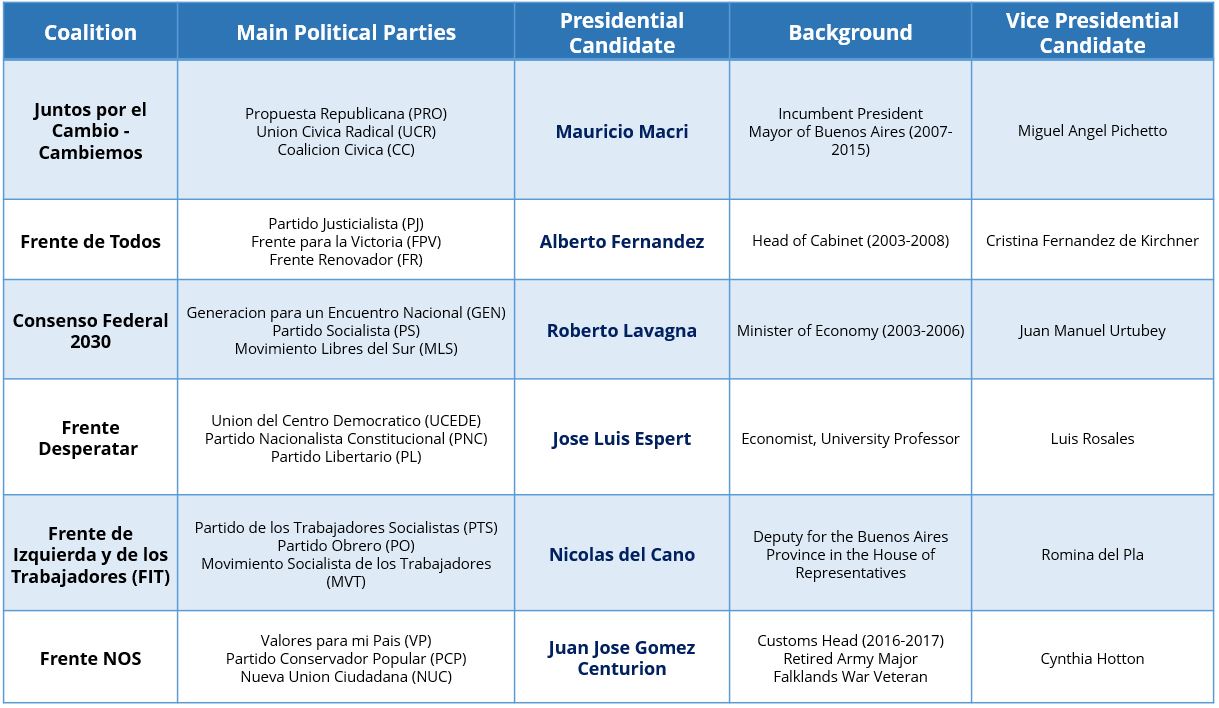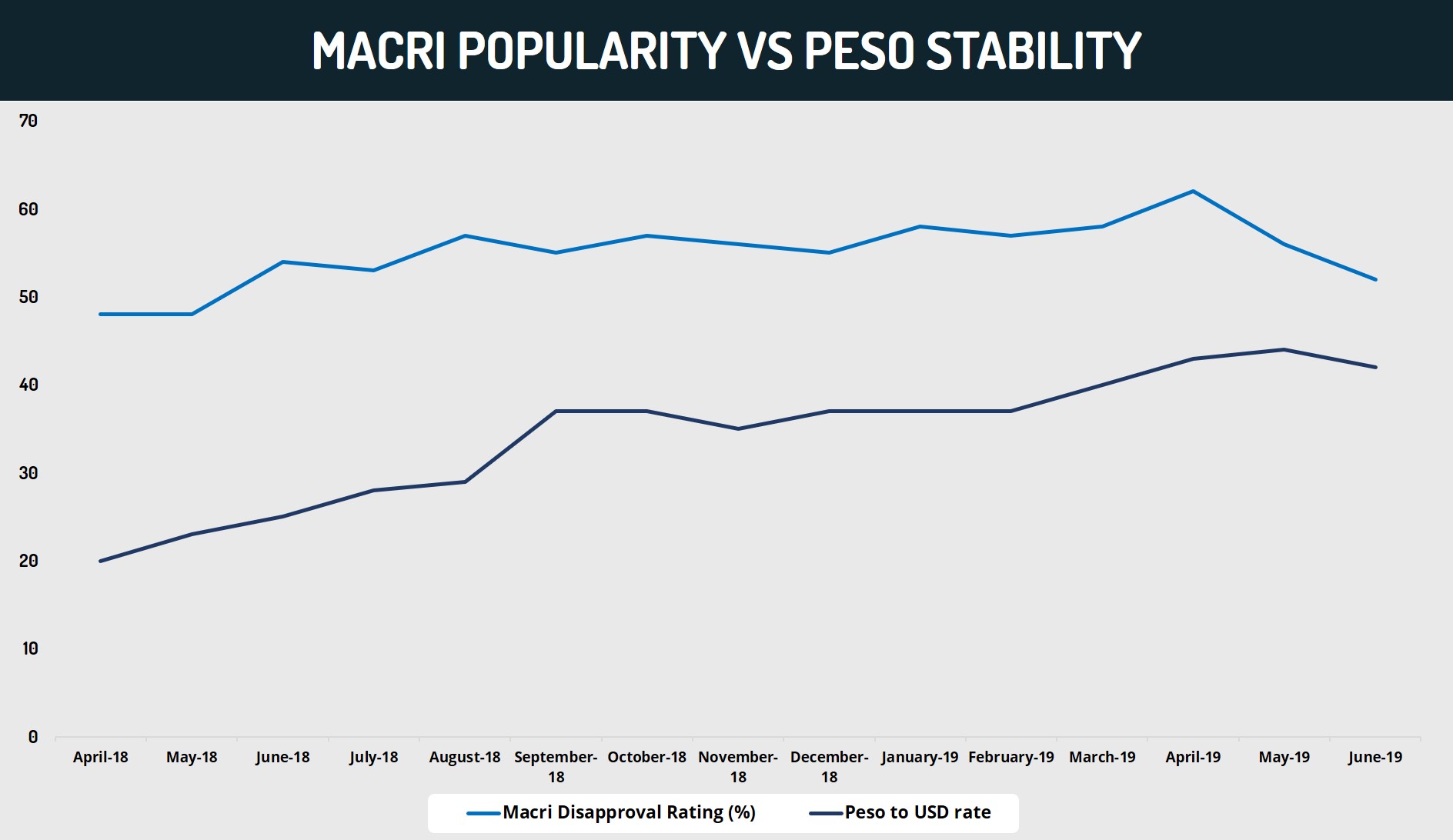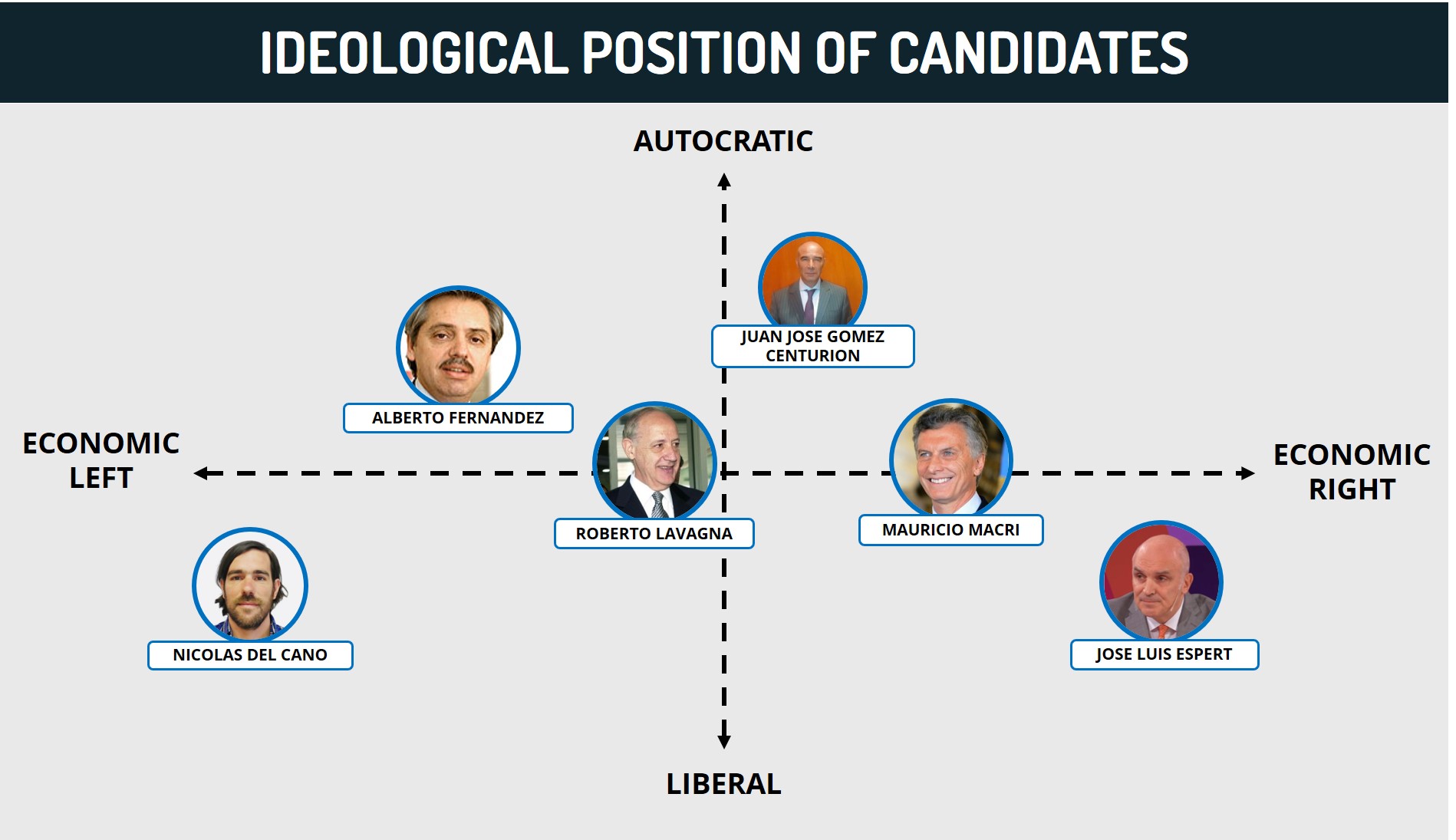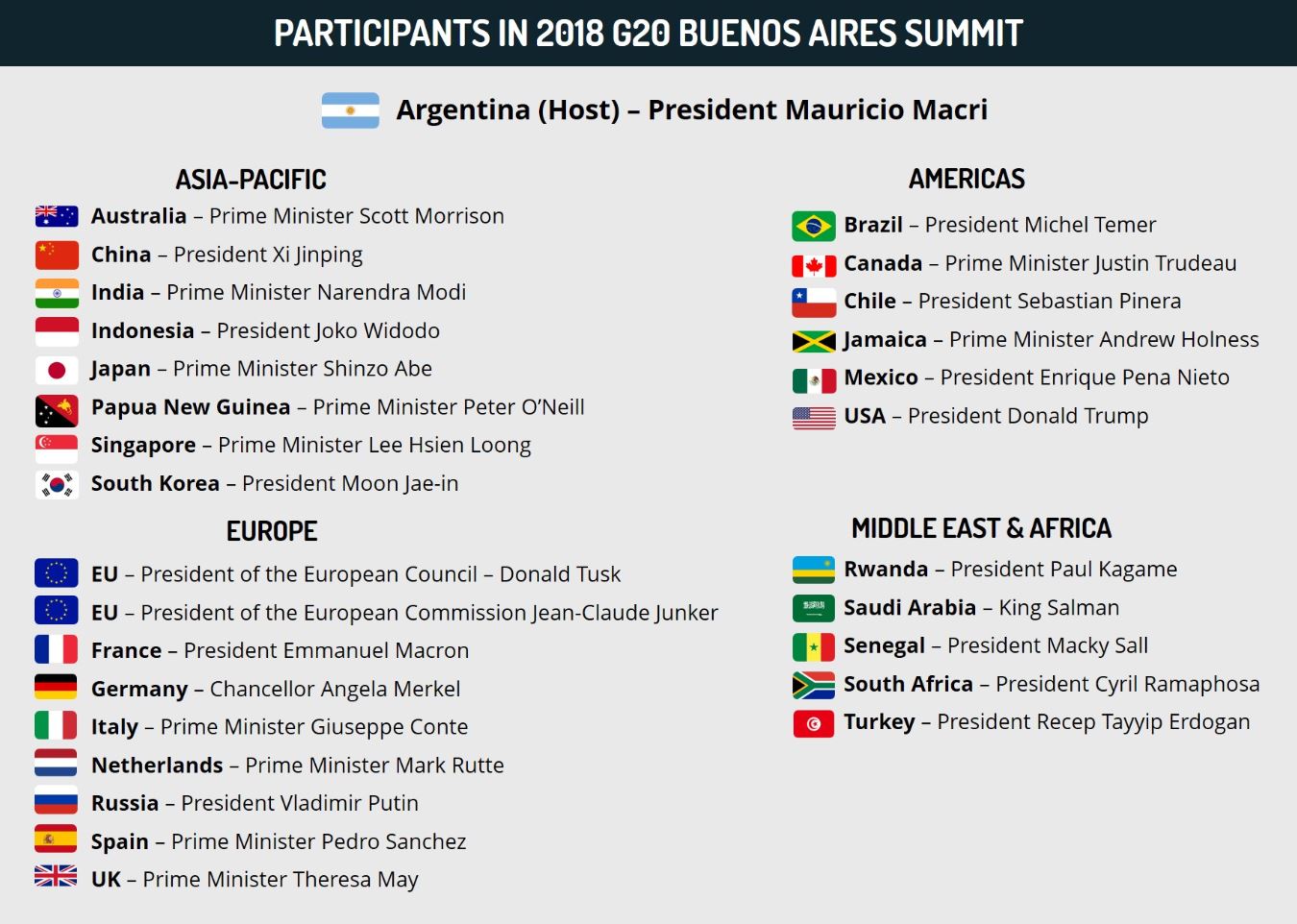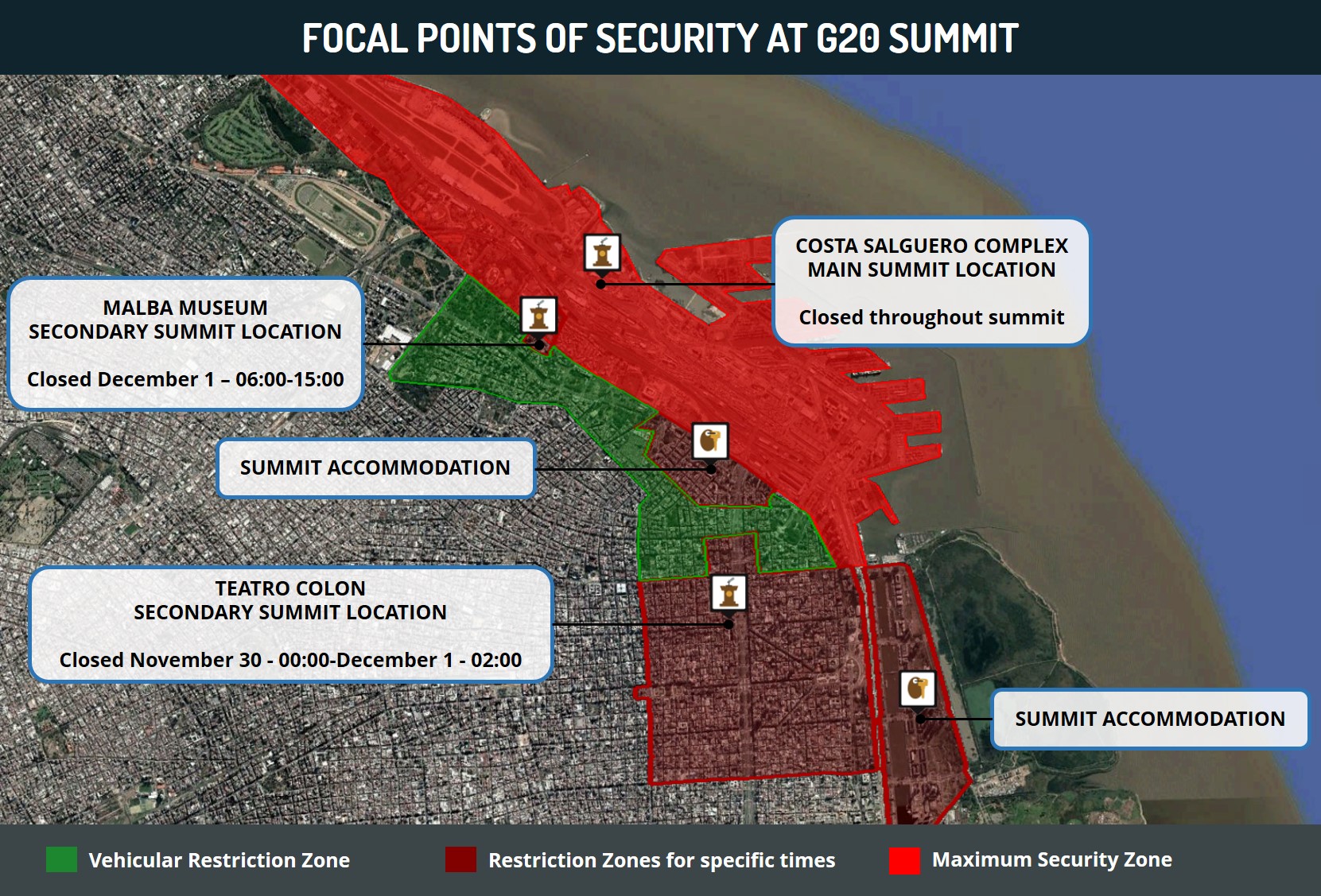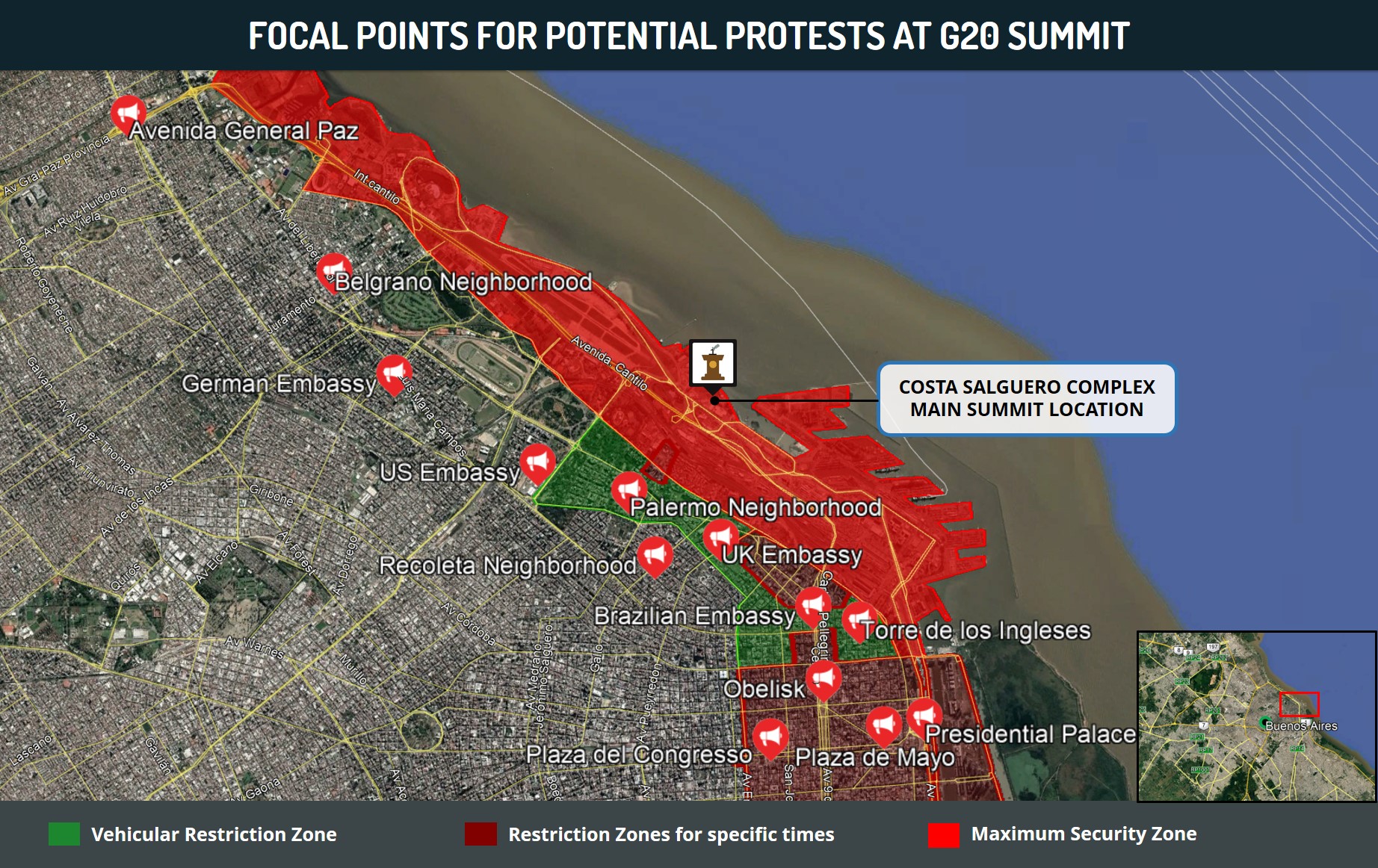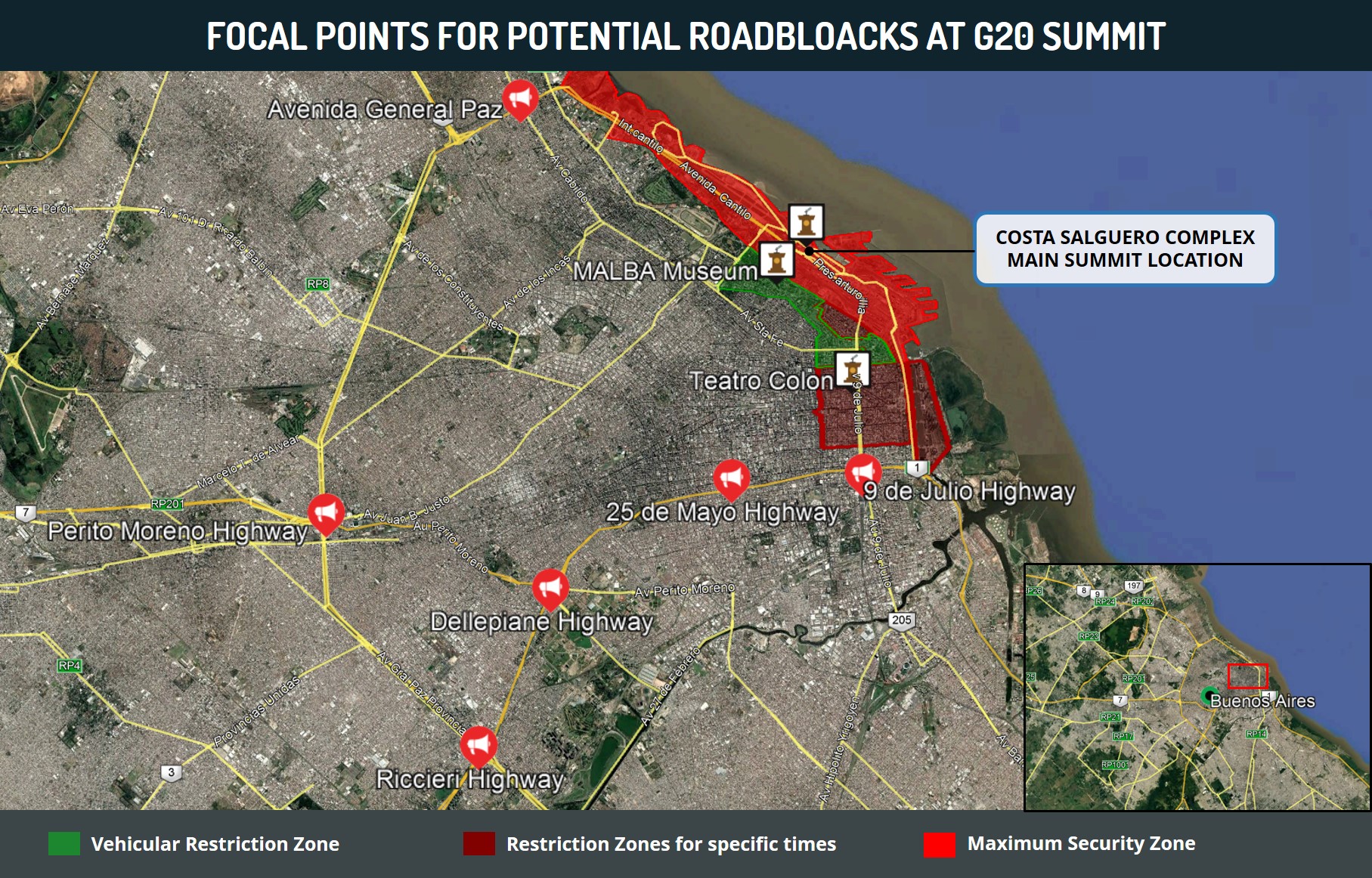Written by Federico Sujarchuk
Executive Summary
The Presidential primary will be held on August 11 prior to the general election for the president, vice-president, National Congress, and the governors of several provinces.
President Mauricio Macri and former President Cristina Kirchner’s choice of running mates reflect the decline of the moderate Peronist opposition, the third largest political force in the country.
Macri’s decision to pick Peronist Senator Pichetto as running mate is likely to bolster his electoral chances and ability to govern.
Kirchner’s decision to run for the vice-presidency and choose Alberto Fernandez as her presidential candidate is unlikely to bolster her chances of winning.
Mandatory primary election likely to soften the expected lead of the Fernandez-Kirchner presidential ticket in the first round of the elections.
FORECAST: Macri likely to win re-election in second round, though Kirchner camp may regain control of most populous Buenos Aires province.
2019 General Elections
Mandatory primary elections are slated to take place on August 11. In this system, which is known as Primarias Abiertas Simultaneas y Obligatorias (PASO), all coalitions run primary elections in the same general polls. All coalitions must take part, both the coalitions with internal factions and coalitions with a single candidacy list.
On October 27, general elections will be held to elect the country’s president, vice-president, members of the National Congress, and the governors of several provinces.
The election of the presidential ticket will be conducted under the ballotage system, a modified version of the two-round system. A candidate can win the presidency in a single round by either winning 45% of the vote, or if they win 40% of the vote while finishing 10 percentage points ahead of the second-place candidate. If no candidate meets either threshold, a runoff on November 24 will take place between the top two candidates.
The candidates and parties taking part in the primaries are as follows:
Background
The announcement of the main presidential tickets comes amid a marked deterioration in the economic situation in Argentina over the last year, partly due to a costly drought in the country’s farm belt during 2018 and a sharp increase in the price of financing for emerging countries whose economies have some characteristics of a developed economy but do not satisfy all of the standards. This situation has fostered a significant devaluation of the Argentinian Peso, which was one of the world’s worst-performing currencies in 2018 and lost 37 percent of its value in relation to the US dollar over the last 12 months. This situation, in turn, exacerbated the country’s inflation, which is expected to reach a rate of 39 percent in 2019. This financial situation prompted President Macri to request a 57 billion USD standby loan from the IMF on September 2018 and accept the fund’s required cuts to public spending.
Since then, President Macri’s approval rating fell significantly and has been largely tied to the value of the Argentine Peso in relation to the US dollar. This is due to the close relationship between this particular macroeconomic factor and the country’s inflation problem, which has consistently ranked in recent years as the most pressing issue for the majority of the electorate, higher in the list than other notable concerns such as security and public corruption. Meanwhile, former President Cristina Kirchner has been slowly but consistently rising in the polls in spite of her alleged involvement in a number of high-profile corruption cases.
Assessments & Forecast
Macri and Kirchner’s choice of running mates reflect the sizeable decline of moderate Peronist opposition
It is notable that both Kichner’s presidential candidate Alberto Fernandez and Macri’s vice presidential candidate Miguel Angel Pichetto, while not particularly well-known, are prominent political figures among the traditional Peronist movement. This movement is largely made up of provincial governors and senators, mayors of the municipalities of Buenos Aires Province, and union figures. It should be noted that in Argentina, provincial governors play a key role in nominating congressional candidates and thus are crucial to lawmaking, and, therefore, to governability. As such, Kirchner and Macri’s choices of running mates were both likely envisioned as attempts to lure as many of the aforementioned actors as possible, who had until recently been the main backers of the moderate Peronist opposition, and are now starting to back either the Kirchner or Macri camps. This is because the governors and mayors fear that the weakening of the moderate Peronist camp could threaten their own chances of re-election.
Moreover, that a prominent figure of the Peronist camp, Sergio Massa, who finished third with 21.4 percent of the vote in the 2015 general elections, announced that he was joining the Kirchner camp as the first candidate for their coalition in the Lower House further supports this assessment. That said, that Massa’s base has traditionally been more anti-Kirchner than anti-Macri and thus his return to the Kirchner camp, having been Kirchner’s Cabinet Chief, is unlikely to prompt a significant portion of his base to vote for the Fernandez-Kirchner ticket.
FORECAST: The moderate Peronist opposition is likely to see the biggest losses of the 2019 general elections, with recent polls indicating they will receive less than half of the votes that Massa gained in 2015. That said, this heightened polarization is unlikely to affect other candidates’ polling, at least until the August 11 primary election.
President Macri’s decision to pick Senator Pichetto as running mate is likely to bolster his electoral chances and governability in a potential second term
Macri’s decision is advantageous not because Pichetto is a particularly popular or well-known figure but rather because of his close relationship with Peronist governors from swing provinces such as Cordoba and Santa Fe, who are likely to discreetly campaign for the Macri camp. This will help boost support among governors, which was already fostered by the federal government upholding financial commitments to the provinces under Macri regardless of their political leanings, a policy which was not sustained under the Kirchner administrations.
Moreover, Pichetto’s influence in the Upper House could offer Macri the ability to pass substantial economic reforms in a second term. This situation, coupled with Pichetto’s reputation as pro-market, evidenced by the fact that he was a key player in allowing Macri to secure a deal with holders of Argentine sovereign bonds in 2016, has had a positive effect on the country’s financial sector and the international markets in recent weeks. This, in turn, is aiding Macri’s anti-inflationary program, which means that the main macroeconomic variables are more likely to remain stable or even slightly improve in the run-up to the elections. Furthermore, since the announcement of the Macri-Pichetto ticket the Argentine Peso gained ten percent of its value in relation to the US Dollar, its largest appreciation since 2002.
Cristina Kirchner’s decision to pick Alberto Fernandez as presidential candidate and run for vice-president unlikely to bolster chances
There are two main reasons that Kirchner taking the vice-president position is unlikely to significantly bolster her chances. Firstly, there are perceptions that Kirchner hinted towards a centrist turn in previous electoral campaigns that never materialized when it came to policy. For example, in the 2007 electoral campaign, she chose a Union Civica Radical (UCR) party member as her running mate and repeatedly claimed her intentions to improve relations with the US, policies which many believe were never enacted. As such, undecided voters are likely to be wary of this new, allegedly more moderate version of Cristina Kirchner. Furthermore, various comments from influential supporters of Kirchner indicating support for modifying the constitution, abolishing the current structure of the judiciary, and freeing politicians jailed in recent corruption cases, could give further weight to these concerns. That said, as previously assessed, Kirchner’s decision to nominate a more moderate Peronist will help boost support of some actors of the traditional Peronist movement, who may bring votes with them. In this regard, the same day the Fernandez-Kirchner ticket was announced eight provincial governors pledged their support.
Secondly, Cristina Kirchner’s decision to run for vice president may end up playing in Macri’s favor. This is because her decision to run for the vice-presidency, rather than the presidency, as well as her overtures to the political center, has eased concerns over the potential impact on the economy. This, in turn, has helped stabilize the economy somewhat, improving Macri’s position, as he typically does better in polls when the economy improves.
Mandatory primary election likely to soften Fernandez-Kirchner’s expected lead in first round
FORECAST: Going forward the Fernandez-Kirchner ticket is likely to sustain a lead over President Macri in the primary and first round, due to the decline of the economy, the ideological closeness of the majority of the smaller leading candidates to the ruling Cambiemos coalition, and their potential to shift votes away from Macri. That said, if Kirchner gains a significant advantage over Macri in the primary, it is likely that some voters who were considering other candidates with a comparable platform to Cambiemos will end up voting for Macri in the first round, fearing that the Fernandez-Kirchner ticket could win outright in a single election.
Kirchner camp likely to regain control over Buenos Aires Province
FORECAST: A victory for the Kirchner camp in the Buenos Aires Province, the most populated in the country, seems more plausible, as there is no second round, making Kirchner’s larger support base in the region potentially enough to see Kirchner’s gubernatorial candidate, Axel Kicillof, succeed. Furthermore, the declining economic situation, which has been particularly severe in the province, suggests that the Kirchner camp will regain control. That said, the popularity of the current Buenos Aires provincial governor, Maria Eugenia Vidal, who belongs to Macri’s Propuesta Republicana (PRO), may see her return for a second term. However, should the Kirchner camp regain the province, it could become a base to challenge Macri’s economic reforms, as well as a stepping stone from which to launch another run in the 2023 Presidential election.
